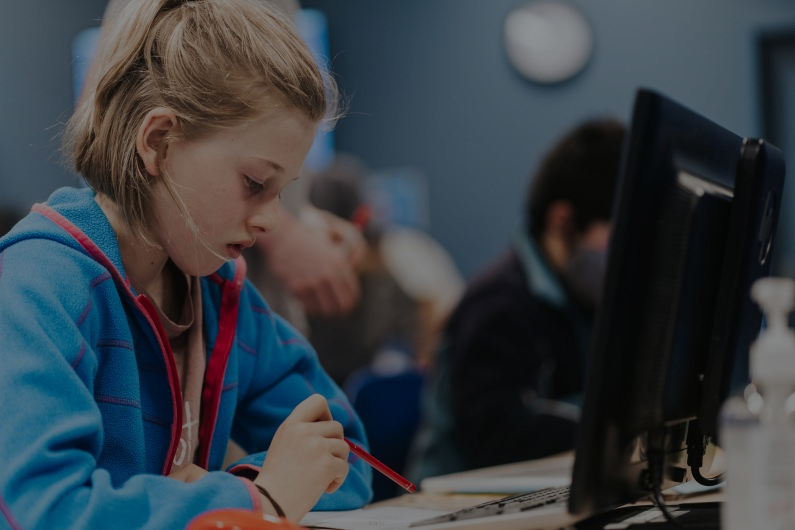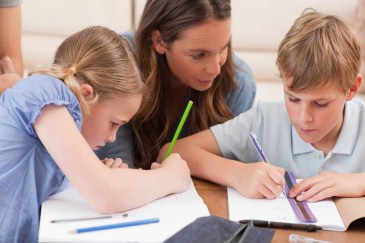4 Steps to a Positive Parent-Teacher Relationship

The harmonious partnership between parents and teachers is not just essential; it's transformative. It’s about nurturing an environment where transparent communication is at the centre, where understanding and empathy form the building blocks, and where trust and mutual respect act as the sturdy pillars.
In this blog, we dive into the crucial steps that pave the way for a positive parent-teacher relationship, ensuring that the educational journey of your child is marked by collaboration, support, and shared goals.
Is your child struggling to keep up with schoolwork? Are they falling behind? Are they bored in class? Or are you looking for extension work for your child? Check out our eBook to learn more about how we help your child improve academically and build confidence through our in-centre after-school tuition.
Understanding Each Other’s Roles
Clarity regarding the roles of parents and teachers in schools is vital. Acknowledging each other’s skills and expertise fosters relationships and helps to gain mutual respect.
Parents actively participating in their child's learning process, supporting classroom activities, and reinforcing lessons at home, create a unified approach to a child's education.
Accept, Help, Ask, and Listen
Parent-teacher meetings serve as windows into a child’s academic world, offering invaluable insights into their progress and challenges. The first step, "Accept," entails embracing every invitation with enthusiasm and gratitude.
These moments, carefully orchestrated by teachers, provide parents with a glimpse into their child's daily experiences and accomplishments at school. By attending these meetings, parents not only demonstrate their active involvement in school but also gain a deeper understanding of the educational landscape their child navigates.
Once at the meeting, "Help" becomes a pivotal action. This is not just an opportunity to passively absorb information but to actively engage. Teachers welcome parental insights because you, as a parent, possess a wealth of knowledge about your child that can enhance the educational process.
Sharing your observations, concerns, or unique traits about your children's education, family or child’s learning style can empower teachers to tailor their methods, ensuring a more personalised and effective approach.
"Ask" is a powerful tool in a parent-teacher meeting. It's the gateway to deeper understanding. Parents can ask questions that go beyond grades and assignments. They can inquire about your child's social interactions, learning challenges, or areas where extra support might be beneficial.
These questions not only make teachers show genuine interest in children but also open avenues for teachers and children to provide comprehensive insights into children themselves, enabling teachers, children and parents to actively contribute to your child's educational journey.
However, the essence of a productive parent-teacher meeting lies in the art of "Listening." Listening actively, without preconceived notions, creates a space for constructive dialogue. By truly absorbing the teacher’s observations, concerns, and suggestions, parents gain a holistic understanding of their child's progress.
Moreover, attentive listening fosters trust, communication and collaboration. If a teacher highlights areas of improvement or concerns, proactive listening by the parent ensures that the parent comprehends the situation fully, paving the way for supportive actions at home.
This same parent and teacher engagement not only enhances a child’s educational experience but also nurtures a profound sense of partnership between teachers and parents ensuring that your child receives the tailored support they need to thrive academically and emotionally.
Setting Realistic Expectations
Collaboratively engaging in homework and setting attainable goals tailored to a child’s abilities are fundamental aspects of fostering positive collaboration between children, teachers, and parents. These practices serve as essential building blocks for productive relationships, nurturing academic growth and fostering a supportive learning environment.
In this scenario, Mrs Johnson, Emily’s teacher, and her parents, Mr and Mrs Anderson, work together to set realistic homework goals tailored to Emily’s abilities. By identifying her strengths and challenges, they establish achievable objectives, dedicating 30 minutes each evening to focused homework tasks.
The Andersons create a supportive home environment, offering consistent encouragement and guidance during Emily’s study sessions. Mrs. Johnson supplements this effort with additional resources and educational games, ensuring a well-rounded learning experience. This collaborative approach not only fosters a positive attitude towards homework but also empowers Emily, building her confidence and academic skills.
Through mutual understanding and support, the teacher-parent partnership enhances Emily’s educational journey, creating an environment where she can thrive academically and develop a lifelong passion for learning.
Balanced expectations create an atmosphere where the child can flourish, buoyed by consistent support and encouragement from both home and school.
Empathy and Understanding
Empathy forms the foundation for connections and bridges understanding between diverse perspectives. Making an effort to grasp the challenges encountered by teachers, children, and parents cultivates unity and strong relationships.
Putting oneself in another's position nurtures mutual understanding and support, especially during difficult moments in the school journey, fostering compassion and strengthening the overall environment of understanding and cooperation.
Building Trust and Mutual Respect
Trust is cultivated through unwavering consistency in actions. Valuing the diverse backgrounds, skills, and unique attributes of teachers fosters a deep sense of mutual respect.
Upholding confidentiality and embracing acceptance establishes a secure environment for open dialogue, fortifying the connections among parents, teachers, and children involved in the educational process.
Fostering a Positive Learning Environment at Home and School
Education extends beyond classroom walls. Creating a conducive learning environment at home, promoting a positive attitude and behaviour at school, and instilling in children, children and teachers a love for learning are shared responsibilities.
By nurturing this passion for knowledge, parents, children, schools and teachers together inspire a lifelong love for learning.
By embracing effective communication, understanding new roles, practising empathy, setting common goals, building trust, involving parents in school activities, resolving conflicts, and fostering a positive learning environment, a robust parent-teacher relationship blossoms.
These steps are not just a blueprint; they are the foundation of a brighter tomorrow for our families, schools, and our children. Let us commit to these principles, for in doing so, we illuminate the path toward a future of families where your child thrives academically, emotionally, and socially.
Together, we build bridges that stand the test of time, shaping generations of families, student's success and children to come.
Our after-school maths and English tutoring programmes are designed to inspire children to achieve their learning goals while providing them with the necessary support to succeed.
Our individualised tutoring approach can help develop children's skills and abilities. To learn more about our programmes and how we can support your child's academic needs, reach out to us by contacting your local centre or booking a free assessment today.



